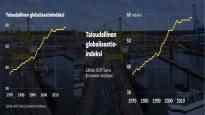U.S. CEO Larry Fink estimates that the Russian offensive war has put an end to globalization. Experts say war will change globalization, but that is not the end point.
Russia’s war of aggression against Ukraine has put an end to the globalization we have experienced over the last three decades.
Such an assessment is the CEO of the world’s largest asset management company Blackrock, billionaire Larry Fink presented at the end of March. According to Fink, the attack and the consequent disconnection of Russia from the world economy will encourage companies and countries around the world to re-evaluate their own dependencies and production chains.
In this way, the war reinforces a phenomenon that has already intensified during a pandemic – the fact that economies and production chains are turning inwards. The scale of Russia’s actions will be visible even after decades, Fink wrote in his letter to investors (moving to another service). The attack is a “turning point” for geopolitics, macroeconomic developments and capital markets, he said.
Is Fink right? Is the Russian invasion war reversing the direction of globalization?
Professor of Logistics at Aalto University Katri Kauppi don’t believe this. Hardly any complete reversal is known, he estimates. That is not realistic, according to Kauppi.
– Current supply and production chains have evolved over the decades. They are based on the availability of raw materials, the diversification and concentration of production and the long-term work of companies.
ETLA’s research director is on the same lines Jyrki Ali-Yrkkö.
– Globalization has not come [sodan takia] end of the road, but it is clearly changing.
The pinnacle of globalization is behind many measures
Globalization can mean many different things. Economic globalization, in a simplified way, means that different countries and regions are in ever closer economic interaction with each other – capital, different products and services flow and bind countries together.
In many respects, the peak of globalization is already behind us. According to ETLA’s Ali-Yrkö, there have been indications of a change in globalization for several years, even before the coronavirus pandemic and the Russian offensive war.
– The pace of globalization began to slow down about five to six years ago. It didn’t take a backseat but started to slow down. This has been seen both in the world and in Finland.
According to Ali-Yrkö, the interest rate crisis accelerated, for example, as supply and production chains began to regionalize as the importance of security of supply became more prominent.
One measure often used to assess globalization trends is the KOH globalization index of a Swiss research institute. It measures economic globalization by, for example, international trade in services and goods, trade barriers and foreign investment.
The index shows that the golden age of economic globalization dates back to the 1990s. By the 2010s, economic globalization had already slowed markedly. Thus, after the financial crisis, globalization has not deepened, according to the index, but has remained more or less at the same level.
A similar development is taking place in a more broadly measured globalization, where the research institute also takes into account political and social globalization. They are measured, for example, by the volume of international calls, the mobility of people and international organizations.
Another graph suggests that the best years of globalization are behind us. Although world trade is doing well, its share of the size of the world economy has shrunk. For decades, the share of international trade increased relative to the size of the world economy. The financial crisis that intensified in 2008 was followed by a sharp downturn, which has not led to a clear upward trend.
“War is a continuum of uncertainty”
Katri Kauppi, a professor of logistics, estimates that global supply chains will work well for a long time, until the problems started a few years ago.
– I see that this war is part of a continuum of uncertainty in the supply chain environment. We have had a pandemic, a shortage of containers, Brexit and other geopolitical uncertainties. As a result, companies have been forced to think about the costs of these risks.
According to Kauppi, supply chain management in companies has changed significantly as uncertainties have increased. Companies now need to find out about all levels of the supply chain, not just their own suppliers, Kauppi says.
According to Kauppi, the war will not cause a rapid change in globalization, but it is likely to leave a mark.
– It has once again highlighted risks and reinforced the trend of preparedness.
But what should be thought of the slowdown in globalization? Is it a good thing or a bad thing?
According to Ali-Yrkö and Kauppi, it is largely a matter of perspective. From a purely economic point of view, a sharp slowdown in globalization is not desirable, at least in theory, Ali-Yrkkö estimates. Indeed, globalization has made it possible for countries and companies to specialize in certain things.
– Globalization boosts economic growth. From a growth perspective, current developments may be poor.
The slowdown in globalization and the inward turn of economies can be particularly problematic for emerging and emerging economies. They will lose a lot of work if international companies drag their production back to the West, Kauppi says.
On the other hand, the environmental burden, for example, may be reduced if the charter of products from the other side of the world is reduced. At the same time, controlling the responsibility of supply chains may become easier, according to Kauppi.
– There is no unequivocal answer to whether the slowdown in globalization is a good thing or a bad thing, Kauppi says.
You can discuss 9.4. until 11 p.m.
